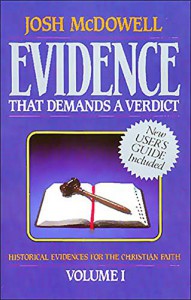[Buried in our posts dating back to 2012 when we launched this website, is this series intended to analyze the claims of Christian apologists. We got no farther than 3 articles though we hope to pick up where we left off and continue examining the claims of the most famous published defenders of Christ-centered faith. We have been told over and over by our former colleagues, “who do you think you are . . . to challenge the likes of . . . .”; to which we answer, we are nobodies compared to them. Still, it is our right to challenge truth-claims no matter who says it, how often it is said, and how many believe it. And even if nobody cares to believe us!
Sequels to this if you care to check them out and prove us wrong by leaving comments we can reply to:
—Admin1.]
————————
How to defend your Christian belief system against skeptics, agnostics, atheists, Jews, and Sinaites? Read Josh McDowell’s Evidence That Demands a Verdict, originally published in 1972 and revised in 1979 (the image on left is from an updated version on kindle format).
A well-meaning Christian gifted us with this book significantly timed on Christmas 2011. Thinking we were simply going through a crisis of faith, perhaps this reminder would turn us around from our temporary “apostasy” and return to the religion we once zealously upheld, actively defended, and successfully drew converts to. Little did this sincerely-concerned Christian friend know that we already had the 2006 updated version, triple the size of the original, retitled Evidence for Christianity: Historical Evidences for the Christian Faith because we believe in checking out all sides of any issue, even what may initially be perceived as the “false” side.
The key phrase in the title: “Historical Evidences.” This book has been in our back-burner for months now, waiting to be engaged point by point. With all the back-and-forth emailing we’ve done with Christian colleagues on random topics, always finding ourselves on the defensive, reacting to “evidence” constantly foisted upon us, perhaps the time has come to be proactive with a more systematic approach. This book gives us a springboard to do so, since it is organized like a lawyer’s brief.
But first, some background on Josh McDowell whose journey is the exact opposite of ours. The author claims to have been a skeptic; while studying to become a lawyer, he started investigating the claims of Christianity. When he was finally convinced, he converted, wrote his book in the style of a lawyer presenting his case before a judge, providing “incontrovertible evidence”— and enough of it, in his estimation to “demand a verdict.” Any reader previously unconvinced would turn into a believer after examining all the “evidence.”
Book sales success encourages more productivity, so McDowell naturally followed up his initial bestseller with sequels along the same lines:
- More Evidence that Demands a Verdict
- More than a Carpenter
- Beyond Belief to Convictions
- The Last Christian Generation
- Answers to Tough Questions,
- Handbook of Today’s Religions
Besides becoming a successful author, he also became one of the most popular speakers throughout the world, one of the primary defenders of the Christian faith today.
A formidable but worthy apologist to engage for neophytes like us Sinaites, wouldn’t you think? Who are we to take on Josh McDowell?
During our fledgling transition time, we might indeed have thought exactly that, but knowing what we know now and having read the “evidence” he presents in his apologetics, we are not at all intimidated. Why? Because like all other exchanges we have had with Christians [all posted on this website], there is one consistent problem common to all of them and that is — the only evidence they can and do present come from New Testament Scriptures and Christian commentators, all of whom argue from the same theological package decided upon by the early Christian councils. The reason is because there is no other source for their arguments. And even when they present “evidence” from the “Old Testament” version of the Christian Scriptures, they simply present the same “prooftexts,” superimposing these on Jesus and the Trinitarian God regardless of the original context of the verses which have absolutely no connection except in a theology that insists it all fits perfectly as prophecy and fulfilment.
We confess we used to argue from exactly the same orientation, that is why we are in a position to see more clearly now that we have been exposed to the “other” side— provided first by current research on the roots and beginnings of Christianity, and reinforced with a better and clearer understanding of the Hebrew Bible’s version of YHWH’s original revelation.
These are sweeping statements on our part and have yet to be expounded detail by detail, point by point, argument by argument . . . all in small, chewable, digestible doses. So continue following this series; reflect, agree or disagree, swallow or spit out. That is the beauty of learning from a resource center that endeavors to present two or as many sides of any argument because readers have to make an informed decision; there is no choice when one has known only one side. We realize most seekers might not have access to resources so this website provides as much as we can within our capability. The intent is to make people think beyond the confines of their religious orientation, dare to venture out and discover what else is out there.
Don’t be afraid to partake of the Tree of Life, the Torah and discover the True God who revealed Himself there so you can learn to be discerning and recognize the counterfeit. There is a lifetime of learning just from the Torah alone; the Jewish sages never quit studying to this day and yet they have been at it for several millennia now.
—————-
UPDATE 2017: Bear with me on this one, for there is a point to it. My father who was a lawyer just like Mr. Josh McDowell, wrote his philosophy of education for his institution of higher learning, the first college in a sanatorium-city he was advised to move to by his doctors after the end of the Japanese occupation of the Philippines. I proudly borrow from his words and color code it green, his favorite color which became the university color; green because it is the color of freshness, new life, and in hindsight on my part, significantly the traffic signal GO! proceed, move forward, it’s safe!
“Education is a shield against the intolerance of the mind.”
His point? Intolerance of the mind is a dead end; mind chooses not to go any further, mind is closed to anything else other than what mind has decided is the whole truth and nothing but! Religious mindsets tend to be like this because religionists think they have the monopoly of truth while everyone else is wrong.
Closely related is another quote from this non-religious wise father. When graduates who receive their diploma think they have “arrived” and are finally “educated”, his reminder on their yearbook is this:
“A diploma is only an inventory of the little that we know. We frame it to remind us that the road to knowledge is endless. Let us spread out and make use of the charm of knowledge for the common good. Knowledge is lost to those who use it only for the good of themselves.”
This is the same wise father who, a few days before he passed away in 1994 when I was desperately trying to convert him into believing in the Christian saviour so that he could make it to heaven and not end up in hell, replied to me:
“My religion is to be good and to do good.”
At that time I did not know nor realize that what he said is basically the Torah. From a very complicated religion with a complicated God and an exclusive salvation message, we Sinaites moved forward to Christianity’s proclaimed foundation — the TNK, the Hebrew Scriptures —where we rediscovered the simplicity of the faith of Abraham and of Moses who listened to and obeyed the God Who defined Himself and His Way. YHWH’s WAY was so simply articulated by my father at a time he suffered a stroke which affected his brain, though evidently while his body was failing, both his mind and spirit were still intact! Indeed it might be enough to simply “be good”, meaning, one behaves and doesn’t cause harm to another . . . but to go farther and “do good”, that means be a blessing to others, that is Torah. (Thanks Dad, what a great ‘how-to-live’ legacy you left; took me a decade and a half to realize how biblically in-sync you were, evidenced in how you lived your life. This coconut hasn’t fallen far from your coconut tree.)
To go back to the message on the scroll that graces this website:
“From the cowardice that shirks from new truth,
from the laziness that is content with half truth,
from the arrogance that thinks it knows all truth,
O God of Truth, deliver us.”
We have not been cowardly in our truth-search, neither have we been lazy. As for the “arrogance” that thinks it knows all truth . . . we can only pray “indeed, O God of TRUTH, thank you for delivering us!”



